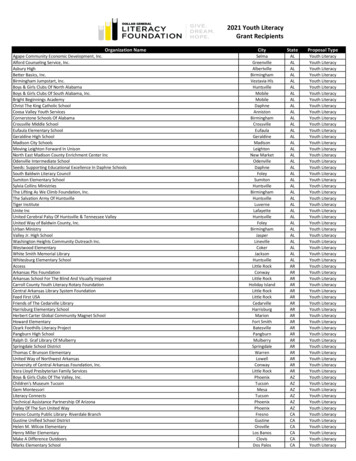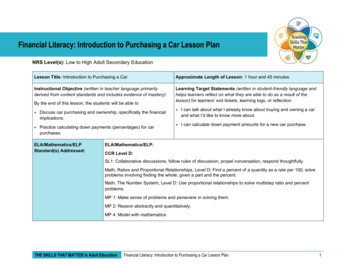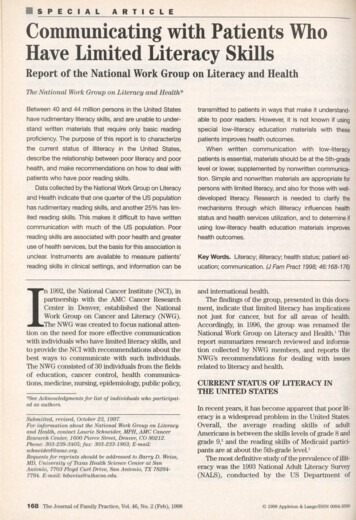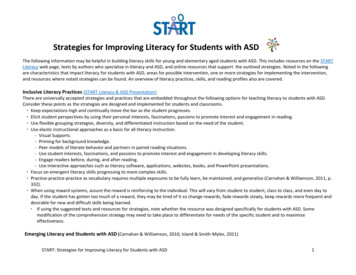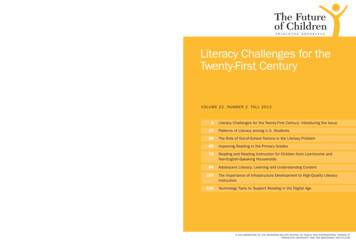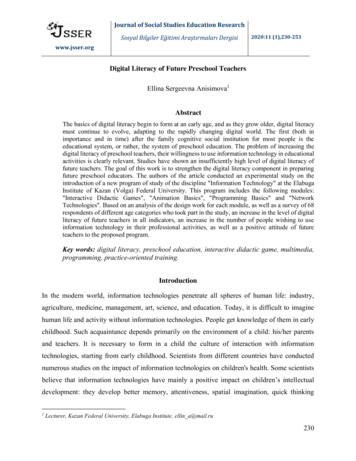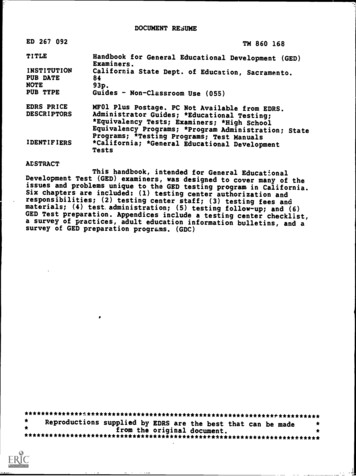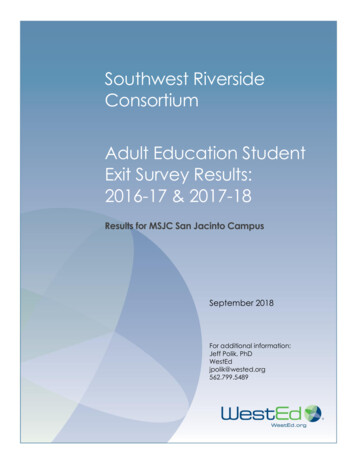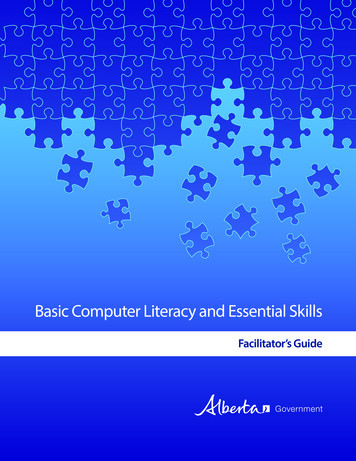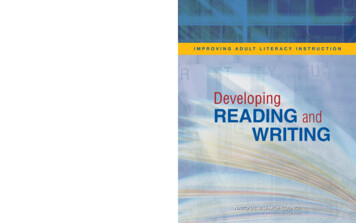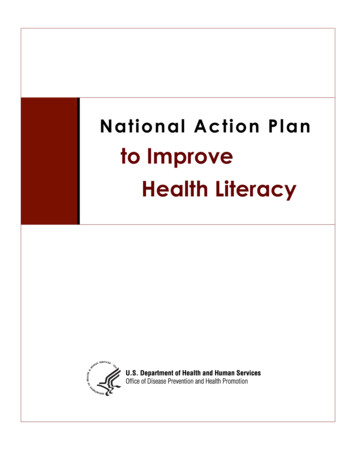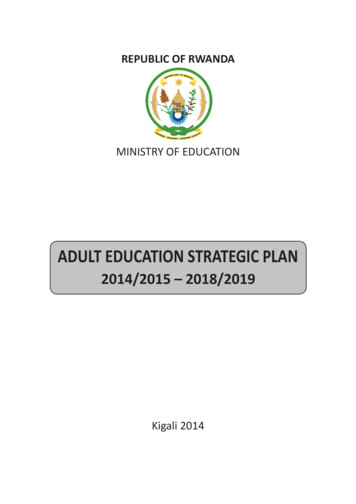
Transcription
REPUBLIC OF RWANDAMINISTRY OF EDUCATIONADULT EDUCATION STRATEGIC PLAN2014/2015 – 2018/2019Kigali 2014
TABLE OF CONTENTSACRONYMS AND UCTION.1PURPOSE OF ADULT EDUCATION STRATEGIC PLAN.1PROCESS OF DEVELOPING THE STRATEGIC PLAN.1ANALYSIS OF LITERACY IN RWANDA.32.1.2.2.2.3.2.4.3.CURRENT SITUATION.3KEY CHALLENGES.3ANALYSIS (SWOT).3KEY STRATEGIC ISSUES.5STRAGIC 6OBJECTIVES.6STRATEGIC APPROACH.7FINANCING THE IMPLEMENTATION OF THE RESULTS FRAMEWORK. 11STRATEGIC RESULTS FRAMEWORK. 11IMPLEMENTATION PLAN.224.1. INSTITUTIONAL FRAMEWORK.224.2. MONITORING AND EVALUATION.23REFERENCES.25iii
ACRONYMS AND NISR :RDRCRWF :UNESCOAssociation of Pentecostal Churches in RwandaAdventist Development and Relief Agency RwandaRwanda Women’s Solidarity AssociationCurricula, Production, Materials and DistributionEconomic Development and Poverty Reduction StrategyEducation For AllHuman immunodeficiency virus/Acquired Immune deficiency SyndromeMinistry of Gender and Family PromotionMinistry of AgricultureMinistère de l’ Administration Locale (Ministry of Local GovernmentMinistry of EducationMinistry of justiceMinistère de l’Intérieur (Ministry of Internal SecurityNon Governmental OrganisationsNational Institute of Statistic of RwandaRwanda Demobilization and Reintegration CommissionRwandan francsUnited Nations Educational Scientific and Cultural Organizationiv
1. BACKGROUND1.1. INTRODUCTIONIn Rwanda, literacy and formal education began only in 1900 soon after the arrival of Christianmissionaries, namely the White Fathers. Despite the fact that they were introduced in Rwanda bymissionaries and colonialists, literacy and formal education faced several obstacles such as traditionalculture, which bound people more to agriculture and livestock as the only means of subsistence.Also, the population considered the time to learn reading and writing as a hobby.Therefore, in this era of globalization, in which the world has become like a village, literacyand Education For All generally are so important especially in the sense that they facilitatecommunication, exchange and a better integration of people in a changing and dynamic world.For the specific case of our country, the development of human resources is one of the main pillarsaround which turns on the Vision 2020. No one doubts that the country’s wealth which ranks firstconsists of its men and women who must be competent, productive and competitive in all sectors oflife. However, Rwanda cannot claim to meet this requirement as long as a portion of its populationremains illiterate. It is on this basis of human resources that vision 2020 and effective, harmoniousand sustainable development will be achieved.Literacy is a vital tool not only for communication but also and especially for learning and transmittingknowledge and consequently an efficient means in the fight against ignorance and poverty. In thisperspective, the development of education in all its forms (formal and informal) is absolutely veryimportant.Literacy is unquestionably the heart of education for all and, in the case of Rwanda is the basis forachieving the following: reduce the poverty, reduce child mortality, curb population growth, achievegender equality, and ensure sustainable development and unity of Rwandans. Literacy allows alsoan open mind, easy access to information, acquisition of new knowledge up to new technologies ofinformation and communication, and a wide openness to the world through reading.Given the many problems facing literacy and their consequences on the development of the country,Rwandan Government has made it an important pillar for sustainable development. An AdultEducation Policy and its Strategic plan were developed as guidelines to overcome them.1.2. PURPOSE OF ADULT EDUCATION STRATEGIC PLANThe purpose of the National Adult Education Strategic Plan is to provide a detailed roadmap andframework for the effective implementation of the Adult Education Policy.This strategic plan 2014/2015- 2018/2019 was designed as a tool for planning, coordination andmonitoring to guide the Ministry of Education in implementing the Adult Education Policy anddefine/determine the role of its different partners for a harmonious development based on humanresources and knowledge led/based economy as defined in Vision 2020.1.3. PROCESS OF DEVELOPING THE STRATEGIC PLANNational consultations were the major avenue through which views from local communities, districts,provinces to national level were sought in the development of both the Adult Education Policy andStrategic Plan.1
At the national level, an Adult Education forum composed of representatives from concernedministries and NGOs: MINEDUC, MIGEPROF, MINIJUST, MINALOC, MINAGRI, ADRA, ADEPR, andthe One UN represented by UNESCO supported the development of both the Adult Education Policyand Strategic Plan. In addition to this, a Steering Committee composed of MINEDUC (lead), Provinceand District representative, FBO representatives, International and local NGOs, in collaboration withUNESCO was established to guide the policy and Strategic plan developmental processes.The detailed results framework contained in this document was the product of previous nationalconsultative workshops which brought together above mentioned representatives.At the decentralised level, a large number of citizens and local leaders participated in Adult Educationconsultative workshops, including Vice-Mayors in charge of Social Affairs, district education officers,instructors, learners, and religious leaders 2
2. ANALYSIS OF LITERACY IN RWANDA2.1. CURRENT SITUATIONSince 1978, the literacy rate has been rising from 39.8% to 53.3% in 1991, and to 60, 4% in 2002with 54.9% for men and for 48.5 % women. According to the National Census 2012, the literacyrate among people aged 15 and above was 68,3% and the literacy rate reported by males was muchhigher than that of females, with 73% and 65 % respectively. Overall, Adult litercy rate is higheramong urban residents (82%) than in rural areas (65%).2.2. KEY CHALLENGESThe Adult Education program has main challenges such as insufficient number of qualified, competentand motivated instructors, limited funds allocated to adult literacy, ignorance of the real importanceof literacy, lack of culture of reading, and lack of access to reading materials.2.3. ANALYSIS (SWOT)The following analysis generally presents the strengths and weaknesses of Adult Education inRwanda and points out various opportunities in this sector for its development and that of educationin general. Constraints in Adult Education are also analyzed as well as proposal of strategies toovercome them.STRENGTHSWEAKNESSES Strong interest and eagerness by manyRwandans to learn; Special attention given to education andliteracy for women over the last ten years; Existence of a common culture for allRwandans; Long tradition of volunteer work in Rwandaand in Adult literacy in particular; Increased awareness of population on theneed for literacy; Poverty that leads to some Rwandanpreferring to give their time to productiveactivities and consider attending literacyclasses as a waste of time; Weak structure and support for AdultEducation planning at local levels Shortage of qualified instructors; Insufficient coordination and follow up ofliteracy centers at decentralized entities; Use of variety of spaces for learning: literacyclasses are sometimes conducted in homes; Existence of a national language,Kinyarwanda, which can be used as themedium of instruction in the literacy centers; Strong private sector in the country with thepotential to support literacy training ; The National Gender Policy and women’sempowerment structures in place; Greater sensitization to the need for literacyskills for making real progress.Listen Irregular attendance of some adult learners;Insufficient training of literacy instructors;Weak instructor motivation;Cultural biases and stereotypes for girls’ andwomen’s education. Lack of culture of reading and buying thebooks Insufficient of access to reading materials,3
OPPORTUNITIESTHREATS Political will on the part of the Governmentto invest in human resources development,resulting in activities for the promotionof education in general and literacy inparticular; Existence of many development partnerseager to interveneto support theimprovement of the education sector; Commitment and participation of severalreligious institutions and local organizationsin literacy programs; Opportunities for national mobilization forliteracy through the annual celebrationof International Literacy Day and MotherTongue Day, on September 8 and February21, respectively; Existenceofdecentralizedentitiesfor planning and implementation ofprogrammes; Availability of infrastructure (churches,schools, administrative offices, etc.,); Promotion of ICT in the country and itsintegration into the education policies; The National Gender Policy in place Membership in the East African Community,the African Union, the United Nations,the Commonwealth and other politicaleconomic communities ,which providesopportunities to learn from the experiencesof other member countries. Existence functional Joint Action Forum atdistrict level, which serves as platform forengaging key stakeholders in Adult Educationand decentralisation. Poverty of some Rwandans; Ignorance of the real importance of literacy; Family disputes and their many implicationson the children’s performance in schools, inparticular and in adult literacy, in general; Scarcity of electricity in rural areas, whichaffects Adult Education activities; Concentration of illiterate population in ruralareas; Limited budget for literacy programmes ascompared to perceived needs ; Weak culture of publishing, reading andwriting in Kinyarwanda2.4. KEY STRATEGIC ISSUESFive key strategic issues were identified through stakeholder consultations and the SWOT analysis,and the following issues form the basis of the Strategic Results Framework, detailed in the nextsection.1. Weak structure and support for adult Education planning at local levels.2. Limited access to quality and equitable literacy services for all needy adult people3. Weak partnership, collaboration and coordination among sectors and key Adult EducationStakeholders4. Limited access to employment and limitations to social and civic participation5. Inadequate system for documentation, monitoring and evaluation of Adult Educationprogram.4
3. STRAGIC FRAMEWORKThe following vision, goal and objectives respond directly to the recommendations of participants innationwide consultation workshops. They also meet major prevailing problems and needs identifiedthrough the situation analysis and the study.3.1. VISIONThe vision of the Adult Education Policy is that ‘‘to make a literate society where all Rwandans haveaccess to, and make full use of, reading and writing and life skills for personal, family, community andnational development, thus contributing to building a country with prosperity and peace.’’The focus of the Adult Education strategic plan is to contribute to the achievement of the overallvision and goals of the Adult Education Policy. The Adult Education strategic plan will guide allstakeholders during the operational planning process, as well as in implementation of services andprogrammes for adult 15 years old and above. The Adult Education strategic plan is a referencedocument for the development of literacy monitoring and evaluation program and will be used forresource mobilization for literacy program.3.2. GOALThe goal of the Adult Education Policy is to build a literate Rwanda through suitable basic literacyand continuing adult education programmes, supported by the creation of a conducive literateenvironment.The goal of the Adult Education strategic plan is to guide the implementation of the Adult EducationPolicy.3.3. OBJECTIVESThe Adult Education Policy and Strategic Plan outline strategies, activities indicators and timeframefor the achievement of the following overall policy objectives:1. To reduce adult illiteracy rate from 68,3% to 95% in 2019.2. To make Adult Education determining pillar in the fight against ignorance and illiteracy whichalso contributes to citizenship building and to a culture of peace and non-violence in Rwanda3. To create a favorable framework for functional adult literacy4. To create a framework for dialogue among different stakeholders in adult literacy5. To mobilize resources and ensure their rational and efficient utilization6. Put in place appropriate Adult Education programs for different special groups, withappropriate teaching aids for adult learners with impairment and the training of instructorsin special needs education.3.4. STRATEGIC APPROACHThe strategies to achieve the objectives of the Adult Education Policy are the following:1. Enhance public awareness through advocating on the importance of literacy and numeracy indaily life, for personal, family and social development2. Increase access and develop quality assurance mechanisms and standards for literacyprograms at national level3. Create and strengthen a partnership and collaboration framework for the different stakeholders5
4.5.6.7.involved in adult literacy, and at the various levels, so as to harmonize their activities andensure synergy of effortsBuild sound monitoring system of literacy program through good use of data and evidencebased planningDevelop relevant and sufficient gender-sensitive curricula , pedagogical materials and teachingaids that respond to learner’s diverse needs and desiresMobilize the girl and women to join literacy programmeOffer continuing learning and provide productive, occupational, and income generation skillsto the new literate population and provide for training programmes, especially to the youthand adults, to help them improve their life conditions and their work opportunities3.5. KEY STRATEGIC OUTCOMES, OUTPUTS AND PRIORITY ACTIVITIESThe Adult Education Strategic Plan contains a comprehensive results framework which is organisedinto five Strategic Outcomes, which will be achieved over the course of the five-year Strategic Plan.1) Operationalize policy and institutional framework to support the implementation of AdultEducation program at all levels2) Increased access to quality and equitable literacy services for needy adult peoplecountrywide3) A strong Public- Private Partnership established for a smooth implementation andresources mobilization for policy programs4) Post literacy Programs fostered for sustainability and suitability of literacy -for employment5) Evidence Based Programming and Effective Monitoring and EvaluationThere are expected results for each Outcome which contains specific activities, with indicators,targets, timelines and budgets, with the responsible actor identified for each activity.While the Adult Education Strategic Plan lays out the recommended policy actions in greater detail,below are the key recommended policy actions which will be implemented to meet the AdultEducation Policy Objectives:1) Operationalize policy and institutional framework to support the implementation of AdultEducation program at all levelsExpected results: Disseminate the Adult Education Policy and Strategic Plan- Dissemination of the Policy and Strategic Plan after Cabinet adoptionExpected results: Institutional framework established- Constitute Technical committee at District , Sector , and Cell level6
2) Increased access to quality and equitable literacy services for needy adult people countrywideExpected results: Increased access to quality of Adult Education services- Strengthen existing Adult Education centers with sufficient human and materials resources- Increase number of Adult Education centers throughout the country- Develop sufficient training manuals and teaching aids- Mobilize senior six finalists to train adult learners- Conduct refresher training for Adult Education instructors in use of functional literacy asmethod of learning and teaching- Develop quality assurance mechanisms and standards for literacy programs- Develop a national qualification and certification framework for Adult Education programs- Promote better synergies between non-formal and formal educationExpected results: Adult Education pre service training system established- Support establishment of Adult Education programme at UR/ College of Education and in TTCExpected results: An inclusive Adult Education program established-Sensitized all people especially girls and women illiterates to attend Adult Education centersSupport Adult Education programs for inmatesEncourage and support vulnerable group to attend Adult Education centersEncourage physically disabled people to attend Adult Education centersDevelop appropriate methodology and teaching aids for adult with disabilitiesTrain instructors in appropriate methodology of teaching people with disabilitiesExpected results: Improved socio-economic status of Adult basic Education instructors- Provide Adult Education instructors with entrepreneurship skills;- Provide incentives to support Adult Education instructors- Provide certificates of merit to Adult Education instructors3) A strong Public - Private Partnership established for a smooth implementation and resourcesmobilization for policy programsExpected results: Increased population awareness on the importance of Adult literacy- Conduct sensitization campaigns on the importance and merits of adult literacy- Hold TV and Radio Talk Shows on Adult Education programsExpected results: Effective coordination system established- Establish inter-ministerial, private partnership and decentralized collaboration mechanismsfor policy implementation7
4) Post literacy Programs fostered for sustainability and suitability of literacy - for employmentExpected results: Mechanism for post Adult Education established- Integrate Adult Education graduates in vocational and technical trainings;Expected results: Strengthen the culture of reading and writing for Adult basic Educationcenter’s laureates- Strengthen the existing and create new community libraries5) Evidence Based Programming and Effective Monitoring and EvaluationExpected results : A Monitoring and Evaluation plan developed and operationalized- Develop and implement the monitoring and evaluation plan for Adult Education performance- Conduct timely data collection on Adult Education program and ensure their dissemination- Carry out researches and ensure findings are published3.6. FINANCING THE IMPLEMENTATION OF THE RESULTS FRAMEWORKThe Ministry of Education has been tasked with providing leadership for Adult Education thoughall concerned Ministries that will contribute through their own budgets. Civil society, Faith-BasedOrganization, Private Sector Partnerships, contributions mechanisms and agreements for sharedresponsibility with Government will be developed. The share of external funding and contributionfrom development partners to support Adult Education activities is also very important. Internationalpartnerships, such as One UN, multilateral and bilateral donors, and international NGOs, areexpanding to assist with the development of Adult Education programs nationwide.3.7. STRATEGIC RESULTS FRAMEWORKThe following table is a comprehensive results framework which will guide implementation ofthe Adult Education strategic plan and act as a monitoring and evaluation tool to assess progresstowards achieving the objectives of the Adult Education Policy. The result chain of the frameworkis organized into five strategic objectives (Outcomes), which will be achieved over the course ofthe five-year strategic plan. Output-level results for each outcome contain specific activities, withindicators, targets, timelines and budgets, with the responsible actor identified for each activity.8
9Total for objective 1ConstituteMoETechnicalcommittee atdistrict , sector ,and cell tionof the Policyand Strategic Plan afterCabinetadoptionDisseminatethe AdultEducationPolicy andStrategic PlanResponsibleActivitiesExpected YICTNGOs FBOs,CBO’s,PartnersTechnicalcommittee atdistrict , sector,and cell levelestablishedMeetings heldDisseminationof summarybrochureIndicators100%coordinating bodiesestablished80% atedcost( RFW )STRATEGIC OBJECTIVE 1: Operationalize policy and institutional framework to support the implementation of Adult Education program at all levels
10StrengthenexistingAdultEducationcenters withsufficienthuman andmaterialsresourcesIncreasedaccess toqualityof AdultEducationServicesIncreasenumberof AdultEducationcentersthroughoutthe country.ActivitiesExpectedResultsNGOSFaith basedOrganizationsDecentralizedentitiesNGOS,Faith basedOrganizationsMoEMoEPartnersResponsibleNumber ofliteracycenterscreatedNumber of literacy centersequippedby teachingand learningmaterialsIndicatorsEach cellprovidedwith twonew literacycenters( 4296 newcenterscreated )5017literacycentersequippedby teachingand 7SRATEGIC OBJECTIVE 2: Increased access to quality and equitable literacy services for needy adult people stimated cost( RFW )
11ExpectedResultsMoEREBDevelopteaching andlearningaidsMobilize anduse of seniorsix finaliststo train adultlearnersResponsibleActivitiesItorerory’ NTEMINAGRIUR/Collegeof Education ,NGOsFaith basedOrganizationsDonorsPartnersNumber ofadult illiteratestrainedNumber ofseminarsorganizedTeaching andlearning material developedIndicatorsUse of 50%of seniorssix finalistsin adulteducationprogramOneseminar andcampaignper yearTeaching andlearningmaterialin useTargets2014/20152015/20162016/2017SRATEGIC OBJECTIVE 2: Increased access to quality and equitable literacy services for needy adult people Estimatedcost( RFW )
12ExpectedResultsMoEMoEPromote bettersynergies betweennon-formal andformal educationMoEResponsibleREBDevelop anationalqualificationand certificationframework forAdult EducationprogramsDevelopquality assurancemechanisms andstandards forliteracy programsConduct refreshertraining for AdultEducationinstructors inuse of functionalliteracy asmethod oflearning centralizedentities, NGOsPartnersNumber of 9YBEinfrastructuresavailable forsupporting AdultEducationcenters duringovertimeA nationalqualification andcertificationframeworkdeveloped andpublishedQuality assurancemechanism andstandards forliteracy programsdevelopedNumber ofinstructorstrained in use offunctionalliteracy methodIndicatorsTwo 9YBE schoolsby Sector in useA nationalqualification andcertification framework adoptedQuality assurancemechanism andstandards forliteracy programsadopted80% of instructorstrained in functioalliteracy methodTargets2014/20152015/20162016/2017SRATEGIC OBJECTIVE 2: Increased access to quality and equitable literacy services for needy adult people 00,000Estimated cost( RFW )382,011,250
13NGOS,DecentralizedentitiesEncourageand supportvulnerable groupsto attend AdultEducation centersMoEFAWE,MIGEPROFE CNEF ,NGOSSensitized all people MoEespecially girls andwomen illiteratesto attend AdultEducation centersAn inclusiveAdultEducationprogramestablishedUR/ College ofEducationSupportMoEestablishmentof AdultEducationprogramme at UR/College of Educationand in TTCPartnersAdultEducationpre servicetraining ltsNumber ofvulnerablepeopleenrolledin literacycenterNumberof girls/womenenrolledin AdultEducationcentersAdultEducationprogrammeat UR/College ofEducationand in TTCIndicators70% ofilliteratesvulnerableenrolledin literacycenters80% ofilliteratepeople and90% of girls/womenilliteratesenrolledin literacycentersStudentsenrolledin EGIC OBJECTIVE 2: Increased access to quality and equitable literacy services for needy adult people ,500,000Estimatedcost( RFW )
hodologyand teaching aidsfor adult withdisabilitiesRCSNGOS,NCPDMoESupport AdultEducationprograms ople toattend AdultEducation centersResponsibleActivitiesAppropriate methodology andteaching aidsfor adult withdisabilitiesdevelopedNumber ofphysicalydisabledpeopleenrolledin literacycentersTeachingand odologyand teaching aidsfor adult withdisabilities usedin all literacycenters30% increase ofdisabled peopleenrolled in literacyclass70% ofinmate’s literacycenters equippedby teaching andlearning C OBJECTIVE 2: Increased access to quality and equitable literacy services for needy adult people 121,208Estimatedcost( RFW )
15Improvedsocio-economicstatusof entives tosupport AdultEducationInstructorsProvide entrepreneurshipskills to AdultEducationinstructorsTrain instructorsin appropriatemethodology ofteaching peoplewith entralizedentities,MINISANTEMYICT, itiesREBNGOS, NCPDPartnersNumber ofInstructorsreceivedincentivesNumberof trainingsessionconductedNumber ofinstructorstrainedIndicators100% of AdultEducationinstructorsmotivated50% ofinstructorstrained80% ofinstructorstrained inappropriatemethodologyof teachingpeople SRATEGIC OBJECTIVE 2: Increased access to quality and equitable literacy services for needy adult people 151,437,500Estimated cost( RFW )
16ResponsibleMoEActivitiesProvidecertificatesof meritto AdultEducationInstructorsTotal for objective 2:ExpectedResultsNGOS, decentralizedentities, Faith BasedOrganizationsPartnersNumber ofInstructorsreceivedthecertificateIndicatorsAll literacyinstructors with5 years of workfor the adulteducation will bemotivatedTargets2014/ 2015/2015 20162016/2017SRATEGIC OBJECTIVE 2: Increased access to quality and equitable literacy services for needy adult people 00Estimated cost( RFW )
17Conductsensitizationcampaigns onthe importanceand meritsof AdultEducationeach year atInternationalLiteracy DayIncreasedpopulationawareness on theimportance ofAdult literacyHold TV andRadio TalkShows on MoEResponsibleRTV, R radio,Private radioNGOsFaith ber ofTalk showper yearNumber ofsensitizationsessionsorganizedIndicators5 Talkshowper yearOnesessionin eachDistrictper 8/201926,020,20125,806,060Estimated cost( RFW )SRATEGIC OBJECTIVE 3: A strong Public- Private Partnership established for a smooth implementation and resources mobilization for policy programs
18Establishinter-ministerial,privatepartnership anddecentralizedcollaborationmechanismsfor policyimplementationActivitiesTotal for objective 3 :ExpectedResultsEffec
The Adult Education Policy and Strategic Plan outline strategies, activities indicators and timeframe for the achievement of the following overall policy objectives: 1. To reduce adult illiteracy rate from 68,3% to 95% in 2019. 2. To make Adult Education determining pillar in the fight against ignorance and illiteracy which
